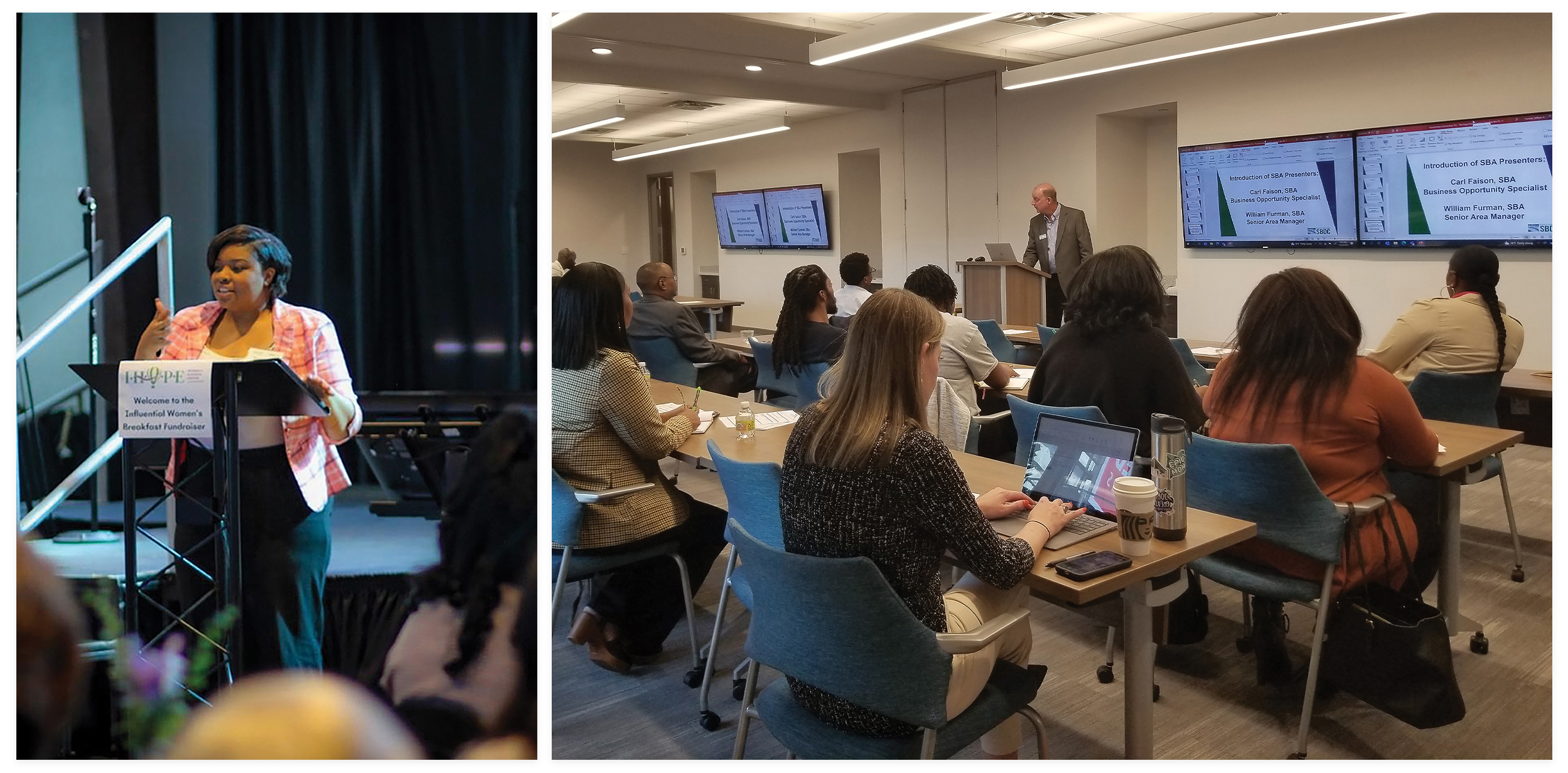The business center hosts its Influential Women’s Breakfast on March 6

The I-HOPE Women’s Business Center sends board members to expos and hosts keynote speakers to help entrepreneurs develop business plans, find funding, and create marketing strategies.
Today’s women mean business. Since the early 2000s, the number of women-owned companies has catapulted by 114 percent worldwide, with Black women representing the fastest-growing segment of entrepreneurs. And the I-HOPE Women’s Business Center (WBC) aims to keep that momentum going.
Since opening its doors in April 2020, this go-getter program, which moved inside North Charleston’s Opportunity Center in 2021, has followed a similar upward trajectory, training nearly 1,700 clients through 176 mostly free events. By offering a full catalog of classes and programs, the I-HOPE WBC meets its clients wherever they are in their journeys.
During an early appointment with business development manager Whitney Brown, Ayasha Calloway realized how much work needed to be done before opening her company, Maude Trucking and Logistics. “I was missing several components that were crucial for a solid business plan,” reflects Calloway. “Since completing my business plan, I have had the opportunity to work with a possible lender, and I am proud to say that during the entire interview, they only needed to ask three questions.” From developing a business plan and finding funding to navigating financial statements and marketing a brand, the center provides guidance to any Lowcountry woman, veteran, or member of an underserved population looking to launch a company.
“Small businesses and micro businesses are the engine of our local economy,” stresses Dorothea Bernique, the founder and executive director of the Increasing HOPE Financial Training Center, which hosts the WBC. “There used to be a women’s business center in Charleston many years ago, but that organization lost its grant and left a definite hole.” So in 2019, seeing the need among aspiring small business owners for knowledge, training, and support, Bernique applied for a grant through the US Small Business Administration (SBA). And in January 2020, the SBA announced grants to 20 agencies, including Increasing HOPE, for the purpose of establishing women’s business centers. With that kick start, the I-HOPE WBC began serving the community just as the COVID-19 pandemic hit.

Attendees of a clinic hosted by the I-HOPE business center learn about how to fund their ventures from William Furman of the US Small Business Administration.
As an extension of the Increasing HOPE Financial Training Center, the Women’s Business Center is well-equipped to deliver services focused on small business success. The program is best known for hosting webinars and workshops tailored to specific arenas. Beyond these classes, volunteer mentors also pair up with clients long-term to provide one-on-one counseling within a certain industries, such as trucking, janitorial work, food service, childcare, or retail.
With guidance from WBC leaders, preschool director Erica Green Cureton secured funding from the Climb Fund to obtain a building at a low rate to establish the Carolina Core Development Center. And LaShaya Norton created a winning pitch for Wanderland Mobile Grocery, earning a $30,000 grant from the South Carolina Community Loan Fund program. Clients are given the opportunity to further expand their network through social events like the I-HOPE WBC’s Influential Women’s Breakfast. (The third installment of this annual event will recognize notable local donors, coaches, and small business entrepreneurs on March 6.)
Demand for the business center’s services has been tremendous as the community has shifted out of the pandemic. In fact, the program just received a 2024 National WBC of Excellence award from the Association of Women’s Business Centers. “Our work has become so well-known that I’m getting calls from all over the state, even beyond our service area. We are fortunate enough that we haven’t needed to do any major marketing campaigns.” What the program does need, however, is volunteer mentors. “We have about eight mentors now, and we could use about 80,” chuckles Bernique, noting that she’d like to recruit a few more business coaches, too. She encourages anyone with useful expertise to reach out and attend one of the volunteer orientation sessions.
The executive director also has her sights set on expanding the center’s reach within the 11 coastal counties it serves. “We need to be able to reach women entrepreneurs in our rural areas,” she says. While virtual offerings are available for those who can’t easily travel to the center’s home base on Rivers Avenue, Bernique is seeking funding for a vehicle that could carry the business center directly to clients. “I would love to see us go mobile.” Much like the clients her program serves, Bernique maintains a clear vision for the growth of the I-HOPE Women’s Business Center.